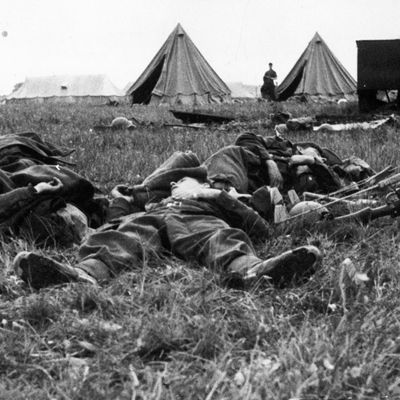
As dads and Harry Styles fans around the globe know, Dunkirk is shaping up to be the biggest male-directed war movie of the summer. But there’s just one problem — the film depicts a World War II battle that took place before America entered the war, which means to U.S. audiences, it might as well be the Battle of Gaugamela. Luckily, Vulture’s official history explainer has arrived. As someone who’s read at least five r/askhistorian threads about Dunkirk, here is everything you need to know before forking over your hard-earned Americans dollars.
Okay, pretend I’m an ignoramus who has no idea what Dunkirk is and might as well think it’s a biopic of Mr. Frederick Dunkirk (played, I assume, by Harry Styles).
The short version: England and France were officially at war with Germany after the invasion of Poland in 1939, but there was a period of about eight months where nothing really happened. The Allies assumed the Germans would attack through Belgium like they did in WWI, but when they actually invaded in May 1940, most of their forces came through the rugged territory in the south — which meant that, when the Germans broke through, the British and French armies up around Belgium were suddenly surrounded. It seemed like they were going to be wiped out entirely, but crucially, the Germans slowed down at the last minute, giving the Allies enough time to evacuate thousands of men through the port town of Dunkirk.
Why did the Germans slow down?
That’s the million-dollar question. German generals liked to blame Hitler, never a terrible postwar PR strategy. However, some experts argue that the Germans had outpaced their supply lines, so slowing down was actually the right call. Besides, the Germans assumed the British had no way of getting all their troops off the continent, so speed wasn’t the highest priority.
Okay. How did the British get the troops off?
That’s what the movie’s about! It was an impressive feat: The big naval ships that could carry lots of troops couldn’t get through the shallow water around Dunkirk, so the British government requisitioned hundreds of small boats — ferries, fishing ships, merchant craft — to get the men off the beaches. Some of these took troops back to the navy waiting offshore, while others took them all the way back to England. Many of them made multiple trips. The whole evacuation took about a week, and all in all, more than 300,000 men were saved, including a fair amount of Canadian, Belgian, and French troops.
So what were the troops doing for a week?
Trying not to die, mostly. Though the Germans slowed down, they still attacked the beach through the air, though the combination of the Royal Air Force and cloudy weather meant the bombings weren’t as deadly as they could have been. But don’t forget, these men had all just come from a battle, which they’d lost, so there were sick and wounded all around. It was not a day at the seaside. Remember that long take in Atonement? That was at Dunkirk.
What happened to the people who were left behind?
Thousands of French and British soldiers had to hold off the Germans to let everyone else escape. Some of them were killed in battle, some of them were executed by the SS, but most of them were taken prisoner and held until the end of the war. British regiments that were stuck in other parts of France were evacuated a few weeks later, in less-dramatic circumstances.
What happened to the French soldiers who got evacuated? Did they just hang out in Britain for five years?
If only. No, most of them were sent back home just in time to fight again in the closing stages of the Battle of France, where they were, in all likelihood, killed or captured.
So was it a defeat? Everything you’re saying sounds a lot like a defeat.
Well, kinda. Think of it more as a disaster that was miraculously prevented from getting even worse. In his big Parliamentary speech afterward, Winston Churchill was adamant that “wars are not won by evacuations,” though that part of his oration tends to get overshadowed by the bit about fighting on the beaches, fighting on the landing grounds, fighting in the fields, etc.
Despite the gigantic role it plays in the collective British memory of the war, the contrarian argument about Dunkirk is that when you zoom out, it wasn’t actually a huge deal: While the soldiers rescued from Dunkirk went on to fight in the North African campaign, it’s not like their presence single-handedly turned the tide of the war. But historians usually agree that Dunkirk was important precisely because it played a huge role in the collective British imagination. People on the home front needed some sort of good news, and the idea of a bunch of plummy civilians in sweater-vests banding together to rescue an entire army is exactly the sort of thing that gets the British popular imagination going. (The American version would be a skateboarding small-business owner preventing a terror attack at a college football game.) Dunkirk was exactly the kind of morale booster that helped the British people get through all the horrors of the war to come, and if that’s good enough for Christopher Nolan, it’s good enough for me.
One final thing: Who is Harry Styles playing?
According to IMDb, Styles is playing a soldier named “Alex.” He’s fictional, so we have no idea what’ll happen to him. But no matter what it is, he’ll probably look great.


